Assertion : Ketones are not easily oxidised
Reason : The oxidation of unsymmetrical ketones is governed by Popoff's rule
(A) and ( R) are true and ( R) is the correct explanation of (A)
Both (A) and ( R) are true but ( R) does not explain (A)
(A) is true but ( R) is false
Both (A) and ( R) are false
The correct Answer is:B
Topper's Solved these Questions
- CARBONYL COMPOUNDBOOK - SURA PUBLICATIONCHAPTER - CARBONYL COMPOUNDEXERCISE - VERY SHORT ANSWER
62 Videos
- CARBONYL COMPOUNDBOOK - SURA PUBLICATIONCHAPTER - CARBONYL COMPOUNDEXERCISE - SHORT ANSWER
26 Videos
- CARBONYL COMPOUNDBOOK - SURA PUBLICATIONCHAPTER - CARBONYL COMPOUNDEXERCISE - ADDITIONAL QUESTIONS AND ANSWERS (FILL IN THE BLANKS)
79 Videos
- BIOMOLECULESBOOK - SURA PUBLICATIONCHAPTER - BIOMOLECULESEXERCISE - UNIT TEST
9 Videos
- CHEMICAL KINETICS BOOK - SURA PUBLICATIONCHAPTER - CHEMICAL KINETICS EXERCISE - UNIT TEST (ANSWER THE FOLLOWING IN DETAIL)
2 Videos
Similar Questions
Knowledge Check
Carbonyl compounds give different oxidation products with different reagents. Several oxidising agents can be used to oxides carbonyl compound. Ammonical silver nitrate (Tollens' reagent) oxidises aliphitic as well as aromatic aldehydes.
R−CHOTollenes reagent −−−−−−−−−−→R−COOH+Ag(Silver mirror)
Strong oxidising agents like KMnO4/H+,HNO3K2Cr2O7/H+ oxidise aldehydes as well as ketones. Open chain ketnoes on oxidation give mixture of two carboxylic acids. Oxidation of unsymmetrical ketones takes place acording to Popoff's rule. According to this rule, α whose bond breks in oxidation always belongs to the alkyl group which has more number of carbons.
The reagent which oxidises only aliphatic ketones is :ATollens' reagentBFehlings' solutionCBaeyer reagentDK2aCr2O7/H+Carbonyl compounds give different oxidation products with different reagents. Several oxidising agents can be used to oxides carbonyl compound. Ammonical silver nitrate (Tollens' reagent) oxidises aliphitic as well as aromatic aldehydes.
R−CHOTollenes reagent −−−−−−−−−−→R−COOH+Ag(Silver mirror)
Strong oxidising agents like KMnO4/H+,HNO3K2Cr2O7/H+ oxidise aldehydes as well as ketones. Open chain ketnoes on oxidation give mixture of two carboxylic acids. Oxidation of unsymmetrical ketones takes place acording to Popoff's rule. According to this rule, α whose bond breks in oxidation always belongs to the alkyl group which has more number of carbons.
2-Methylcycolhexanone on oxidation will give :AHOOC(CH2)5−COOHBHOOC(CH2)3−CH3∣CH−COOHCHOOC−CH2−CH3∣CH−(CH2)2−COOHDCH3−CH3∣CH−CH2−CH2−CH2−COOHCarbonyl compounds give different oxidation products with different reagents. Several oxidising agents can be used to oxides carbonyl compound. Ammonical silver nitrate (Tollens' reagent) oxidises aliphitic as well as aromatic aldehydes.
R−CHOTollenes reagent −−−−−−−−−−→R−COOH+Ag(Silver mirror)
Strong oxidising agents like KMnO4/H+,HNO3K2Cr2O7/H+ oxidise aldehydes as well as ketones. Open chain ketnoes on oxidation give mixture of two carboxylic acids. Oxidation of unsymmetrical ketones takes place acording to Popoff's rule. According to this rule, α whose bond breks in oxidation always belongs to the alkyl group which has more number of carbons.
Which of the following ismost reactive towards oxidation ?AHCHOBCH3CHOCCH3−O∣∣C−CH3DCH3−CH2−CHO
Why ketones do not easily unergo oxidation?
View SolutionAldehydes are less easily oxidised than ketones.
View SolutionCarbonyl compounds give different oxidation products with different reagents. Several oxidising agents can be used to oxides carbonyl compound. Ammonical silver nitrate (Tollens' reagent) oxidises aliphitic as well as aromatic aldehydes.
R−CHOTollenes reagent −−−−−−−−−−→R−COOH+Ag(Silver mirror)
Strong oxidising agents like KMnO4/H+,HNO3K2Cr2O7/H+ oxidise aldehydes as well as ketones. Open chain ketnoes on oxidation give mixture of two carboxylic acids. Oxidation of unsymmetrical ketones takes place acording to Popoff's rule. According to this rule, α whose bond breks in oxidation always belongs to the alkyl group which has more number of carbons.
The prduct of given reaction is
is
View SolutionCarbonyl compounds give different oxidation products with different reagents. Several oxidising agents can be used to oxides carbonyl compound. Ammonical silver nitrate (Tollens' reagent) oxidises aliphitic as well as aromatic aldehydes.
R−CHOTollenes reagent −−−−−−−−−−→R−COOH+Ag(Silver mirror)
Strong oxidising agents like KMnO4/H+,HNO3K2Cr2O7/H+ oxidise aldehydes as well as ketones. Open chain ketnoes on oxidation give mixture of two carboxylic acids. Oxidation of unsymmetrical ketones takes place acording to Popoff's rule. According to this rule, α whose bond breks in oxidation always belongs to the alkyl group which has more number of carbons.
Tollens' reagent gives positive test with :
View SolutionStatement-I: Ketones are less reactive than aldehydes.
Because
Statement-II: Ketones do not give Schiff's test.
View Solution
